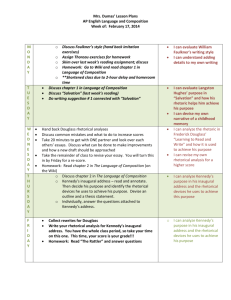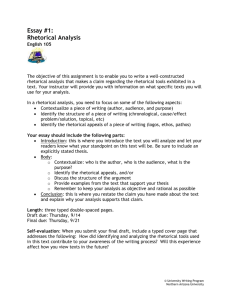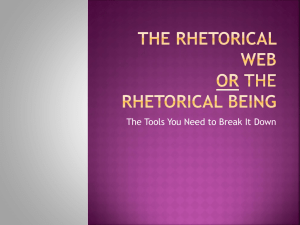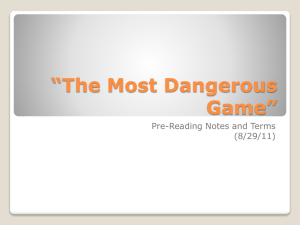English Lesson.doc - EDD
advertisement
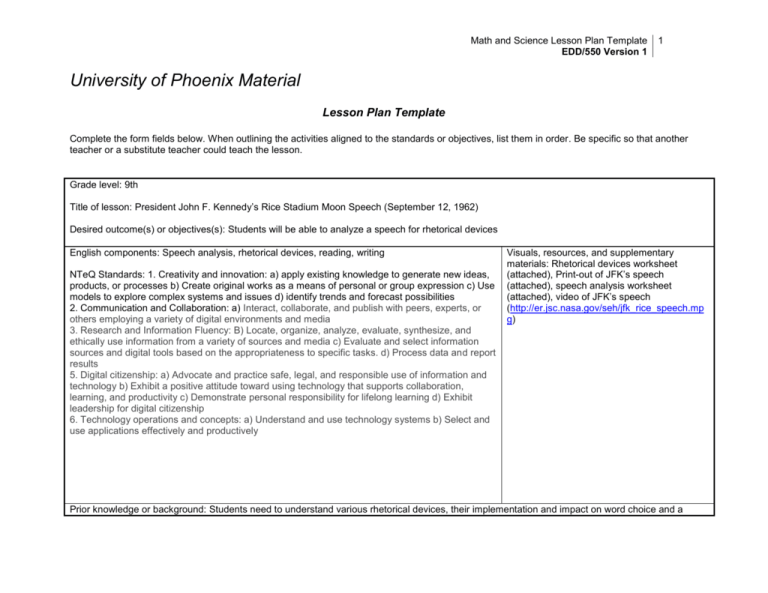
Math and Science Lesson Plan Template EDD/550 Version 1 1 University of Phoenix Material Lesson Plan Template Complete the form fields below. When outlining the activities aligned to the standards or objectives, list them in order. Be specific so that another teacher or a substitute teacher could teach the lesson. Grade level: 9th Title of lesson: President John F. Kennedy’s Rice Stadium Moon Speech (September 12, 1962) Desired outcome(s) or objectives(s): Students will be able to analyze a speech for rhetorical devices English components: Speech analysis, rhetorical devices, reading, writing NTeQ Standards: 1. Creativity and innovation: a) apply existing knowledge to generate new ideas, products, or processes b) Create original works as a means of personal or group expression c) Use models to explore complex systems and issues d) identify trends and forecast possibilities 2. Communication and Collaboration: a) Interact, collaborate, and publish with peers, experts, or others employing a variety of digital environments and media 3. Research and Information Fluency: B) Locate, organize, analyze, evaluate, synthesize, and ethically use information from a variety of sources and media c) Evaluate and select information sources and digital tools based on the appropriateness to specific tasks. d) Process data and report results 5. Digital citizenship: a) Advocate and practice safe, legal, and responsible use of information and technology b) Exhibit a positive attitude toward using technology that supports collaboration, learning, and productivity c) Demonstrate personal responsibility for lifelong learning d) Exhibit leadership for digital citizenship 6. Technology operations and concepts: a) Understand and use technology systems b) Select and use applications effectively and productively Visuals, resources, and supplementary materials: Rhetorical devices worksheet (attached), Print-out of JFK’s speech (attached), speech analysis worksheet (attached), video of JFK’s speech (http://er.jsc.nasa.gov/seh/jfk_rice_speech.mp g) Prior knowledge or background: Students need to understand various rhetorical devices, their implementation and impact on word choice and a Math and Science Lesson Plan Template EDD/550 Version 1 2 speech as a whole. Standards Addressed: Massachusetts ELA Curriculum Frameworks: Critical Thinking Strategies: Open ended questions around the purpose and intent of President Kennedy’s word choice Grades 9-10 Reading: 1. Cite strong and thorough textual evidence to support analysis of what the text says explicitly as well as inferences drawn from the text. 2. Determine a theme or central idea of a text and analyze in detail its development over the course of the text, including how it emerges and is shaped and refined by specific details 3. Determine the meaning of words and phrases as they are used in the text, including figurative and connotative meanings; analyze the cumulative impact of specific word choices on meaning and tone. 8. Delineate and evaluate the argument and specific claims in a text, assessing whether the reasoning is valid and the evidence is relevant and sufficient; identify false statements and fallacious reasoning. Grades 9-10 Listening: 2. Interpret information presented in diverse media and formats (e.g., visually, quantitatively, orally) and explain how it contributes to a topic, text, or issue under study. 3.Delineate a speaker’s argument and specific claims, distinguishing claims that are supported by reasons and evidence from claims that are not. 4. Evaluate a speaker’s point of view, reasoning, and use of evidence and rhetoric, identifying any fallacious reasoning or exaggerated or distorted evidence. Activities: Introduction: Take attendance. Introduce (briefly) who President John F. Kennedy was. Ask students to take out rhetorical device worksheets. Pass out text of JFK’s speech and speech analysis worksheet. Explain that they will be both listening to and reading President Kennedy’s speech on the space race from 1962 with the goal of analyzing it for rhetorical devices. (5-10 minutes) Teaching Activities: Put the text of the speech on the SmartBoard. Have student volunteers take turns reading the speech aloud to the class as a whole. Ask students to define rhetorical devices (rhetorical questions, metaphor/simile, repetition, logos, ethos, pathos etc.) as preparation for group work. Place students in groups of three or four. Have groups complete speech analysis worksheet and share out with the class afterwards. While students are working, teacher should navigate the room facilitating and assisting when and where necessary. The focus should be on student collaboration, communication, and problem solving if an issue arises. Once sheets are completed, go to the SmartBoard and highlight/underline various rhetorical devices as the students direct you from their groups. Discuss importance of those devices to the speech’s message and tone as a whole. (25-30 minutes) Closing Activity: Show students video of speech. As an exit ticket, ask students what rhetorical device, used by JFK, they think is the most effective and why? (16 minutes) Math and Science Lesson Plan Template EDD/550 Version 1 3 Reflection: This lesson effectively makes use of critical thinking skills by asking students open ended questions and allowing for analysis of purpose. Without one correct answer, students are required to reason their way through an argument to make create a response. The open-ended nature requires students to evaluate all information available to them. By asking students to determine the purpose and intent of Kennedy’s word choice, they must understand his message and evaluate how the words fit.



